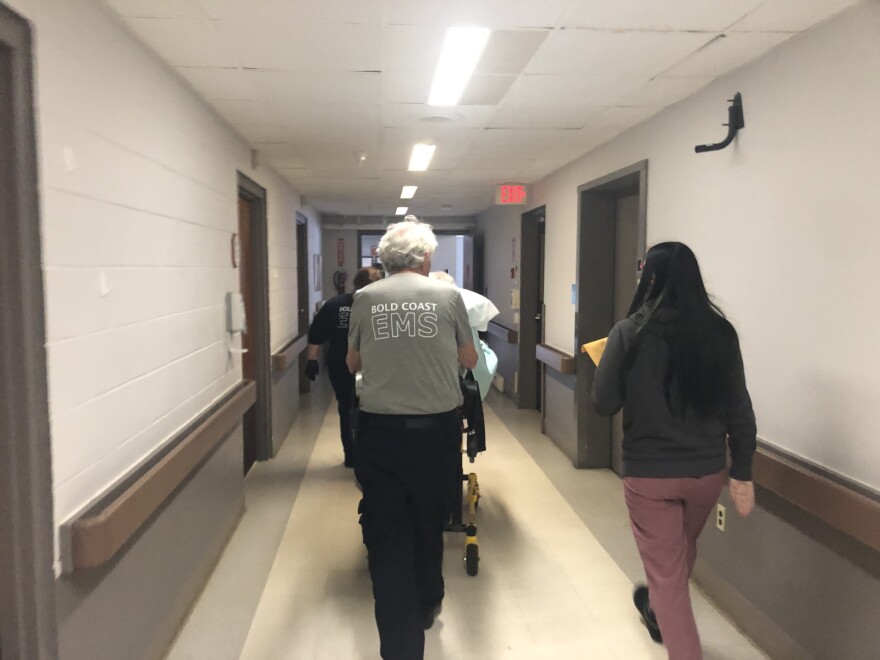A month after Narraguagus Bay Health Care in Milbridge announced its plan to close, nearly all of its 46 residents had been relocated. Only one remained. And early on a Monday morning in June, an ambulance crew arrived to transport her to another facility in Belfast, more than an hour away.
"We're going to slide you from this bed to this bed, ok?" a crew member tells the resident.
After sliding her onto a stretcher, the crew wheels her out down a bare hallway that, not long ago, was decorated with artwork and photos. It's the last of many goodbyes, and it hasn't been easy, said housekeeping supervisor Cindy Roggenback.
"Those people were my family," she said. "I'm losing my second home that meant a lot to me."
Fellow housekeeper, Robert Prescott, said he'll also miss the place.
"This is probably one of the better jobs I've had for feeling good about yourself," he said. "A lot of people go home from work and hate their job. You make people happy here some days."

Over the past decade, 26 nursing homes in Maine have closed. And as the numbers shrink, it's becoming harder to relocate residents within 60 miles, which state regulations call for.
"That really is the goal, is that you want to place people not more than 60 miles away,"
said Brenda Gallant, Maine's Long-Term Care Ombudsman. Her office advocates for residents of long term care facilities.
"Sometimes that's impossible if you can't find a provider that has an open bed, or there's a facility that can't meet the resident needs," Gallant said.
That was the case for John Drollett, who was relocated from Narraguagus Bay Health Care nearly three hours away to Lewiston.
"Don't get your hopes up that they're going to find you a place like they say they are, because right now, they're dwindling fast," he said.

More than two months after he moved, his long-time partner, Kathy Parsons, hasn't been able to visit. They have to rely on phone calls.
"Having him so far away is awful," she said.
Parsons said they were blindsided by the closure of Narraguagus Bay. And it was made even worse because they felt they had no options.
"They were like, 'well, this is all we've got.' Well, we had no say in it. None. It wasn't even a conversation," she said. "It was just, 'this is gonna happen.'"
Beyond the hardship of a long drive, Gallant, the Long-Term Care Ombudsman, said relocating can be traumatic for residents.
"They can suffer from relocation stress, they can have a decline in condition," she said. "Increase in falls, depression, there are many studies that document this."
Closures are happening across the U.S., but a recent report from the Federal Reserve Bank of Boston found that the rate of nursing home closures in New England is three times the national rate — and Maine had the highest percent of closures in the region. The report also found that from 2022 to 2023, more than half of facilities in each New England state operated at a loss.
"The last two years have been awful," said Dr. Steve Weisberger, who owned Narraguagus Bay Health Care for 30 years. He said the real trouble started with a staffing crisis during the pandemic. He was forced to use agencies that provided 'travel' nurses at a much higher cost. And that never changed.
"The way it was going, we were going to have almost a million dollar loss this year."
Maine has made efforts to train more direct care workers and boost their pay, which currently must be at least 125% of the minimum wage. But the Maine Health Care Association, which represents nursing homes, said it's unclear whether state efforts will be enough to prevent more closures.
And that means more residents will likely have to relocate — sometimes several times.

"My dad is not having a good end of life," said Samantha Jones of Blue Hill.
Jones had already moved her father from another facility into Narraguagus Bay earlier this year. He had only been there for 10 weeks when they announced that it was closing.
"The idea of moving him again, it feels unconscionable," she said. "Like, why would you do that to a healthy person, let alone, you know, a person who has memory problems?"
Each move is like starting over, and she has to advocate for him all over again. After spending his life as a teacher and giving to the community, she said, it's not fair that her dad keeps losing his.





